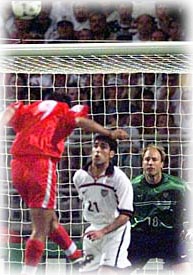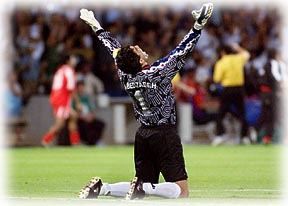|
|
|
|

Jewish World Review / June 23, 1998 / 29 Sivan, 5758
The Goal Heard 'Round The World
Iran 2, US 1, Mullahs zilch
By Josh Pollack
WHEN I WAS YOUNGER, I played soccer enthusiastically, something not unusual for an American of my
Not so elsewhere! The worldwide popularity of the World Cup tournament (the World Cup of Football, as everyone but us calls it) should serve, along with the metric system, to remind us that it is we, not foreigners, who are truly different. And as Sunday's match with Iran should demonstrate, we are unique in another way as well: Americans lack any sense of historical memory. Our callow youths who went down to defeat in France on Sunday, 2-1, could only vaguely recall the hostage crisis of 1979-81, a well-publicized event that occured within their lifetimes and did more to establish the course of American politics in the 1980s than any other single phenomenon, but one goal will get you two that every member of the Iranian team knows that the CIA participated in the 1953 coup d'etat that overthrew Mohammed Mossadegh, the democratically elected Prime Minister of Iran, establishing the absolute rule of the Iranian king, or Shah, until the revolution of 1979.
So it should come as no surprise that the Iranian team, rated poorer than the Americans in most respects, was head-and-shoulders above its opponent in a category of singular importance: will to win. Their hunger, their sheer desire to beat the American team, combined with their low ranking, suggest that they will not do so well in the next round of play, but what does it matter? The Iranian team's mission for this tournament has been accomplished.
A better outcome could hardly have been imagined, both emotionally and politically. America's team was crushed, but the nation collectively shrugged, united in indifference. Iran, more divided against itself than ever before in the last two decades, collectively rejoiced. Indeed, the remarkable amity on the field, featuring an unusual joint team photo, exchanges of gifts, and extremely sportsmanlike, even brotherly, conduct throughout the game, contrasted vividly with the contending factions represented in the stands, and the cutthroat political maneuvers taking place throughout the day in Tehran.
In the stadium in Lyon, despite the best efforts of security forces, some fans waved the royalist version of the Iranian flag, with the shah's lion emblem in the center, while others flew the current, Islamist, version, with a stylized "Allah" in the center and the phrase "Allahu Akbar" repeated throughout the design. Others chanted the name of Maryam Rajavi, self-declared President-in-exile and the leader of the one-third female Mujahedin-e-Khalq Organization, or MKO, a fanatical, Iraq-based force of dissident fighters known for getting the better of Iranian regulars in past battles. Despite these sharply defined differences, jubilation at the win swept the stadium.
Back in Tehran, the knives were out for Abdullah Nouri, the Minister of the Interior, and the public champion of embattled Tehran mayor Gholamhossein Karbaschi, who now faces a highly politicized trial on corruption charges. Karbaschi and Nouri are prominent allies of Iranian President Khatami, whose relatively liberal social policies and conciliatory attitude towards the United States, announced to the world in a January interview on CNN, offend, disturb and frighten his conservative opponents. Citing his role in permitting an unprecedented demonstration by Iranian students against the arrest of Karbaschi, these Islamist hardliners pushed Nouri's impeachment through the Majlis, Iran's parliament. Defiant, Khatami immediately reappointed Nouri as a deputy president, an office not subject to confirmation by the Majlis.
At this sensitive and distracted moment, the moderate government is unable to engage too closely with the United States. An overture from Secretary of State Madeleine Albright, delivered last week at a speech to the Asia Society in New York, failed to garner a positive public response. On the quieter side of diplomacy, sources say, her counterpart Kamal Kharrazi, the Iranian Foreign Minister, has withdrawn an unpublicized invitation to a former American official to visit Tehran.
But the tide is turning against the hardliners, and the soccer victory represents a big wave. More in keeping with the spirit of the day's political infighting, Iranian Supreme Leader Ayatollah Ali Khamenei addressed the victorious team thusly: "Tonight, again, the strong and arrogant opponent felt the bitter taste of defeat at your hands. Be happy that you have made the Iranian nation happy." Khamenei's comments, redolent of the enduring Iranian sense of resentment and inferiority towards the seemingly insurmountable power of the "Great Satan," miss the point. While the friendly pre-game activities of the American and Iranian teams were reportedly not aired on Iranian TV (along with any crowd shots showing revealingly dressed women), no viewer could possibly have missed the evident kindness and respect demonstated by each side for the other over the course of the game, shown in helping hands, conversation, and no-hard-feelings body language after collisions.
Meeting face-to-face, as they have in recent wrestling competitions in both Iran and the US, American and
generation. It sometimes does seem, as the motto of the AYSO youth leagues has it, that "Everyone Plays." Besides the offsides rule, which I never quite grasped, the basics of soccer are easy enough to learn and execute. Only later do American kids move on to the subtleties and dramatic tension of baseball, the sanctioned violence of (American) football and hockey, and the slam-bang, high-scoring action of basketball. For most, soccer fades into a few recollections of shin guards, grass-stained knee socks and fingers sticky from gobbling quartered oranges at halftime every Sunday, after Sunday school.

Hamid Estili's flying header puts the ball past US goalie Kasey Keller, securing the lead, which Iran did not surrender.
Iranian athletes treated one other as equals. And this time, the Iranians won on the merits of their play, fueled by a greater desire to win. Seemingly all Iranians, at home or in exile, representing the most violently opposed factions, joined together in celebration. The sensations of self-respect and empowerment, first seen in the elections that brought Khatami to power last May and next seen in the demonstration protesting the arrest of Karbaschi, have undoubtedly been strengthened. Short of the dangerous proposition of actually impeaching Khatami, the hardliners stand little chance of reversing the new momentum of events. Popular sentiment is increasingly less afraid of the American bugbear and ready for major changes. The harder Khamenei and his ilk struggle to block Khatami's initiatives, the greater the chance they stand of being swept away entirely by the next boost in national confidence, or the next, or the 
Goalie Ahmad Abedzadeh exults at the end of the game. After his seven saves, Iran may never be the same.
Josh Pollack is a contributing editor at JWR.
5/29/98: Nuclear fire and the water's edge: American foreign policy shackled by American politics
5/12/98: Oslo's little brother (the Copenhagen Declaration)
4/6/98: Take my alliance, please (NATO expansion)
2/22/98: Some thoughts on the eve of war (the confrontation with Iraq)
1/21/98: The dance of symbols: Bibi and Yasser in Washington
1/7/98: Iran's new opening to America
12/28/97: Arabic lessons are no substitute for Poli Sci: the dangers of the territorial fixation